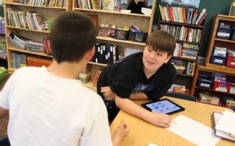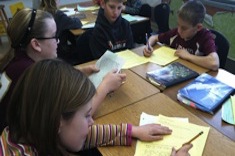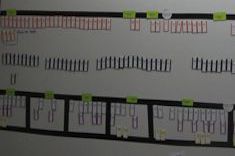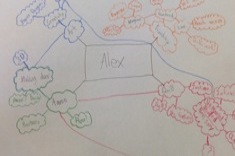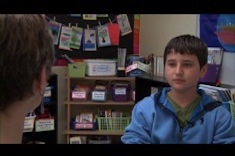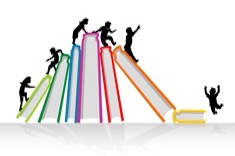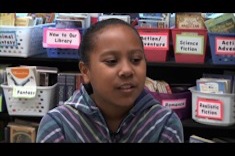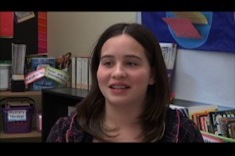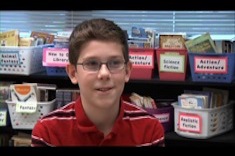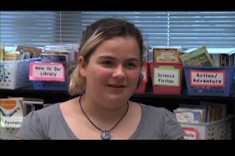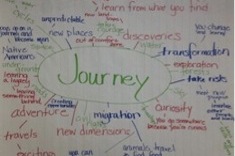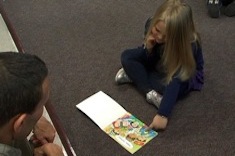Assessment Tools
Making sense of the enormous amount of student data in any classroom or school is probably the biggest challenge we face individually and in our school communities. Here you'll find everything from one-page templates created by teachers for use in their classrooms to videos of staff teams poring over large data sets. We don't have all the answers, but we do provide tools to help you ask better questions as you evaluate students and talk about assessments with your colleagues.
Latest Content
Letter to Franki Sibberson’s Students
Here is a letter Brenda Power wrote to Franki Sibberson's students about why adults observe children, if you're looking for ways to explain the presence of adult visitors in classrooms.
Grading in Literacy Workshops
Katherine Sokolowski finds grading student work in her fifth-grade classroom becomes far more interesting when students take responsibility for choosing what will be graded.
Peer Evaluation of Student Writing
Megan Ginther found she was spending too much time responding to student writing, and just as important, taking on too much of the responsibility for improvement. She tackled the issue by developing a new program for peer evaluation of student writing.
Jumping Off the Buzz Wagon: The Value of Reading Logs
Are you ready to ditch your reading logs? Not so fast. Franki Sibberson explains why she still uses them in her third-grade classroom.
Reading Passports
Justin Stygles develops reading passports as an alternative to traditional reading logs with his fifth- and sixth-grade students.
Giving Audio Feedback to Student Writing
If you find yourself buried in student work that needs a response, you’ll enjoy suggestions from Bill Bass for using a nifty new online tool.
Tutoring Ruth: Designing an Assessment
Max Brand continues his new tutoring series. In this installment, he designs a creative intake assessment for Ruth, a first grader who struggles with following directions.
Planning for Instruction: Sea Glass
Karen Terlecky uses sea glass as a metaphor for the assessments she completes to launch the year, and data analysis all year long.
Final Literacy Contracts: Student-Generated Themes
Megan Ginther and Holly Mueller close out the year with their final literacy contracts. It’s time for students to take ownership of their learning, so they select the themes.
The Data Wall Debacle
Shari Frost has a suggestion for what shouldn’t be on classroom walls: student assessment scores. She explains why this practice can be harmful to students.
Student Work Ethic: Overcoming Spring Fever
Katherine Sokolowski finds the work ethic of her fifth-grade students is flagging by spring, so she helps them reflect upon and improve their performance.
Reading Interviews: Part 3
We conclude our video series of end-of-year reading interviews with Ruth Shagoury. In this installment, she asks students about how they have changed as readers throughout the year.
Understanding the Summer Slide: Sharing Data with Parents and Students
Clare Landrigan and Tammy Mulligan explain why it is important to share data with parents while school is still in session in order to avoid the summer slide. This is another installment in their summer reading series.
Writing Interviews: Part 3
Ruth Shagoury’s end-of-year writing interviews finish with questions about change and the teacher’s influence on writing.
Reading Interviews: Part 2
Ruth Shagoury asks sixth-grade students about reading at home and how they have changed as readers this year.
Writing Interviews: Part 2
Ruth Shagoury’s end of year writing interviews with sixth graders continue with questions about writing strengths and weaknesses.
Writing Interviews: Part 1
Ruth Shagoury interviews sixth graders about their writing at the end of the year. This is the first video in a three-part series.
Reading Interviews: Part 1
Interviews at the end of the school year can help students consider their growth as readers and writers. In this week’s video, Ruth Shagoury interviews sixth graders about their reading. This is the first video in a three-part series.
April Literacy Contracts: Discovery
Megan Ginther and Holly Mueller choose a theme of discovery for their April literacy contracts.
Remembering to Slow Down at the End of the School Year
Maria Caplin shares her strategies for slowing down at the end of the year with her fifth graders and reflecting on the growth and learning that can't easily be measured with tests.
March Literacy Contracts: Nonfiction Curiosities
This month’s literacy contract for middle school students focuses on nonfiction texts and growing independence in the classroom.
15 Minutes on Friday: Writing on Demand with Students
Mary Lee Hahn finds 15 minutes of writing on Friday builds fluency and confidence in her fifth-grade students, and gives her a wealth of formative assessment data at the same time.
Jennifer Serravallo on Formative Assessment (PODCAST)
Franki Sibberson chats with Jennifer Serravallo about formative assessment in this podcast. Jennifer is the author of The Literacy Teacher’s Playbook, Grades 3-6: Four Steps for Turning Assessment Data into Goal-Directed Instruction.
Liberty and Dystopia: February Literacy Contracts
Megan Ginther and Holly Mueller focus their February Literacy Contracts on dystopias.
Streamlining Research Check-ins
Gretchen Taylor finds streamlining research check-ins in her middle school classroom is easy to do when she uses a simple online tool to eliminate a mountain of paper.
Journeys and Quests: January Literacy Contracts
Middle school teachers Megan Ginther and Holly Mueller focus on journeys and quests as the theme of their January Literacy Contracts in the latest installment of their year-long series.
Exploring Winter with Short Texts
Middle school teachers Megan Ginther and Holly Mueller focus on winter in short texts as the theme of their December Literacy Contracts in the latest installment of their year-long series.
November Contract: Family and Memoir
The November installment of Megan Ginther and Holly Mueller’s yearlong literacy contract series has a theme of family and memoir.
Learning from Kidwatching
Quiet kindergartners can be a challenge to understand when they are in the beginning stages of learning social and academic norms. Andie Cunningham uses observation to make sense of five-year-old Sierra’s learning.
Creating Your Own Kindergarten Assessment
Max Brand finds standard assessments don’t always give him the information he needs when working with kindergarten English language learners, so he develops his own tool for analyzing book handling skills.
Browse Content By
Type
Category
- Assessment Tools
- Big Fresh Archives
- Booklists
- Choice Numeracy
- Classroom Design
- Common Core
- Community Building
- Conferring
- Content Literacy
- Digital Literacy
- English Language Learners
- Equity
- Family Relations
- Free Samples
- Guiding Groups
- Leadership
- Literacy Coaches
- Mentor Texts
- Minilessons
- New Teacher Mentors
- Podcasts
- Poetry
- Quote Collections
- Reading Strategies
- Self Care
- Struggling and Striving Learners
- Talking and Listening
- Teacher Study Groups
- Teaching Reading
- Teaching Writing
- Word Study and Vocabulary
Author
- Melissa Quimby
- Nawal Qarooni
- Gwen Blumberg
- Julie Cox
- The Lead Learners
- Hannah Tills
- Josie Stewart
- Ruth Metcalfe
- Mallory Messenger
- Becca Burk
- Jodie Bailey
- Vivian Chen
- Mary Brower
- Tiffany Abbott Fuller
- Stephanie Affinito
- Ruth Ayres
- Leigh Anne Eck
- Heather Fisher
- Shari Frost
- Julie Johnson
- Suzy Kaback
- Gigi McAllister
- Shirl McPhillips
- Melanie Meehan
- Cathy Mere
- Debbie Miller
- Tara Barnett and Kate Mills
- Tammy Mulligan
- Dana Murphy
- Bitsy Parks
- David Pittman
- Brenda Power
- Heather Rader
- Matt Renwick
- Mandy Robek
- Christy Rush-Levine
- Gretchen Schroeder
- Jen Schwanke
- Brian Sepe
- Katherine Sokolowski
- Stella Villalba
- Jennifer Vincent
Grade Level
Choice Literacy Membership
Articles
Get full access to all Choice Literacy article content
Videos
Get full access to all Choice Literacy video content
Courses
Access Choice Literacy course curriculum and training


